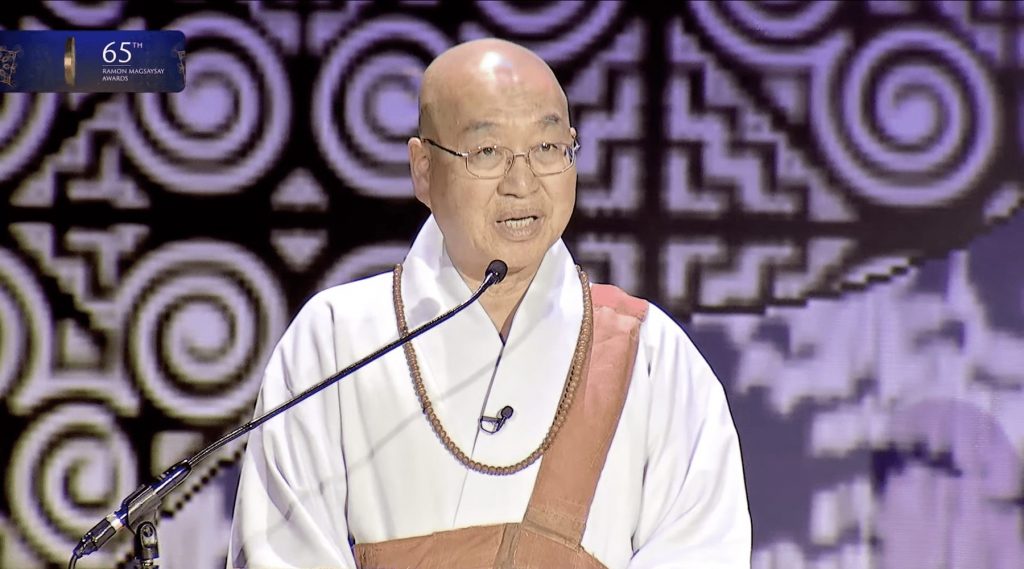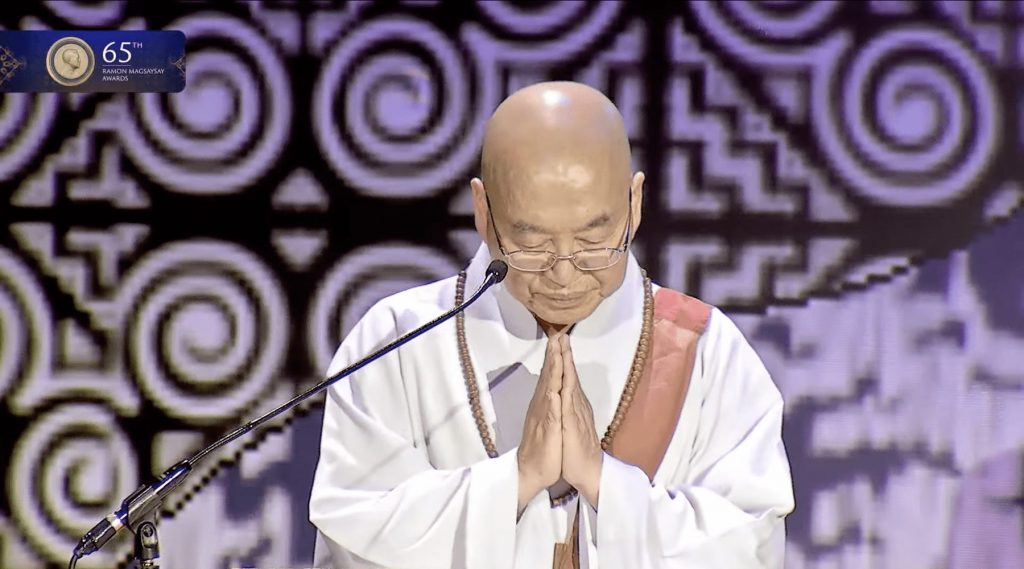Published by BDG on November 13, 2023

The 65th Ramon Magsaysay Awards, sometimes dubbed the “Nobel Prize of Asia,” recognized four outstanding individuals and their transformative leadership and social contributions at a ceremony held in Manila on 11 November. As part of the proceedings for the occasion, the revered Korean Dharma master and Buddhist activist Venerable Pomnyun Sunim (법륜스님) was invited to deliver the keynote speech for the prestigious event.
The Ramon Magsaysay Award is an annual prize established to recognize and honor individuals in Asia and who have achieved distinction in their respective fields and have served others generously and courageously, without anticipation of recognition. Named after Ramon Magsaysay, the seventh president of the Philippines, the prize was established in 1957 by the trustees of the New York City-based Rockefeller Brothers Fund in cooperation with the government of the Philippines. Since its inception, the award has been granted to more than 300 remarkable individuals and organizations.
This year, four people were presented with the Ramon Magsaysay Award. Clockwise from top left: Eugenio Lemos from Timor-Leste; Dr. Ravi Kannan R. from India; Korvi Rakshand from Bangladesh; and Miriam Coronel-Ferrer from the Philippines. From youtube.com
This four recipients of this year’s awards are:
Miriam Coronel-Ferrer from the Philippines, who has been instrumental in settling war disputes and resisting her country’s martial rule. She contributed to the drafting of the country’s first National Action Plan on Women, Peace, and Security, which was officially adopted in 2010. She co-founded the Southeast Asian Women Peace Mediators in 2020, providing a safe dialogue space for women in the Philippines, as well as countries such as Afghanistan and Myanmar. Coronel-Ferrer is recognized for her “unwavering belief in the transformative power of non-violent strategies in peace-building.”
Dr. Ravi Kannan R. from India, who helped to develop the non-profit Cachar Cancer Hospital and Research Centre (CCHRC) into a comprehensive treatment center. Under Dr. Kannan’s leadership, the CCHRC aims to become a state-of-the-art cancer center where no patient, regardless of background or status, will be denied appropriate cancer treatment. Dr. Kannan has been selected for this year’s award because of his strong devotion to his medical profession and focusing on what medicine is truly for: pro-health and people-centerd treatment.
Eugenio Lemos from Timor-Leste, an agriculture expert who has helped the Timorese community embrace new ways to appreciate agriculture and nature preservation by promoting organic farming and modern sustainable agro-systems. In 2001, Lemos established Permakultura Timor-Lorosa’e (Permatil), which hosts youth training camps on water and natural resource management, agriculture, aquaculture, and agroforestry.
Korvi Rakshand from Bangladesh, founder of the non-profit JAAGO Foundation, which has provided free, government-recognized English language education to more than 30,000 students throughout Bangladesh. Rakshand is recognized for his notable work in developing inclusive education for underprivileged children.
In his keynote address on Saturday, Ven. Pomnyun Sunim, himself a recipient of the 2002 Ramon Magsaysay Award for Peace and International Understanding, for his compassionate action to mitigate the human cost of the division of North and South Korea, and for his work toward the reconciliation and reunification of the Korean Peninsula, offered his deep respect and congratulations to this year’s four award recipients, and shared powerful and moving insights into the power and obligation of ordinary people to manifest the conditions for a peaceful and united world:
For 65 years since 1958, the [Ramon Magsaysay Award] foundation has endeavored to identify the courage of countless heroes, who have sacrificed for peace, human rights, democracy, and the welfare of everyday people across Asia. To us Asians, they have become symbols of hope and courage who have transcended national boundaries.
Esteemed guests and fellow citizens of the world who are watching us right now online, for the past 30 years I have supported and worked side-by-side with the untouchables in India, refugees in Afghanistan, indigenous and Muslim people of Mindanao in the Philippines, Rohingya refugees from Myanmar, and the refugees of North Korea. And beyond the absolute desolation and poverty afflicting these peoples of Asia, I have realized that there have always been tensions and conflict. And without resolving these conflicts, we cannot sustain humanitarian aid, guarantee human rights, or ensure children’s education, which forms the foundation of their future dreams.
We are facing an ever-increasing and chilling wind of war today. Violence and intimidation based on “might is right” is everywhere. Conflicts based on race, ethnicity, and territory and religion are laying waste to homes and communities of people around the world. As we speak, we are witnessing people being killed in communities devastated as a result of Russia’s invasion of Ukraine, Hamas’s assault on Israel, and Israel’s indiscriminate attacks and total quarantine of Gaza.
In the two world wars in the first half of the 20th century, we experienced the incomparable losses of tens of millions of people and the complete destruction of societies, leading us to the realization of our own inhumanity toward one another, and resulting in an international agreement on peace, security, human rights, and humanitarianism.
Unfortunately, in less than a century, we are back here again, indulging in our inhumanity, having forgotten our painful lessons. The world is once again dividing itself into “us versus them” and justifying military conflicts.
We demonize others by claiming that we are right and you are wrong. We justify disproportional vengeance by claiming victimhood. We have desecrated the UN charter for peace, and the Security Council, established to guarantee peace throughout the world, is instead being used to deny the resolution approved by the majority of member states. We have to stop immediately the killing of the innocent and the destruction of our communities and this Earth.
The only and most urgent solution is peace. Peace is not just the mere absence of war and violence, but a state of being without conflict or discrimination. And how do we achieve such peace?
First and foremost, immediately stop the war. War is violence. Nothing can justify the killing of civilians and children. There is no just war in this world. War can only be tragic and criminal. Declare an immediate armistice to stop the killing of civilians and allow humanitarian support to flow fully.
Second, begin the dialogue for peace. Such dialogue begins from mutual respect and understanding. Peace cannot be achieved through strength alone. One-sided, arbitrary demands only bring about the destruction of all. Acknowledge that we have deep differences in ideology and values. Dialogue for peace can only begin on this foundation of such difficult, mutual recognition.
Third, citizens of the world must rise up for peace. Peace can only be achieved through the courageous actions of everyday people. I recently visited the United States, and met with various officials, from the White House to Congress and the government. I informed them of the rising tensions on the Korean Peninsula and pleaded for food and medicinal support for the 25 million people suffering in North Korea. Most of the officials I met were pessimistic about the potential for peace on the Korean Peninsula. But no amount of pessimism will stop me. I live on that peninsula, along with 75 million South and North Koreans. War cannot be allowed to occur again on this land. There are those who warn us that war cannot be stopped, even if we come together.
There are those who say we are too late. But we cannot give up. Just as dawn always breaks after a long night, we can witness peace if we persevere. Whatever sacrifices efforts are demanded, peace is worth it because it is always the best choice. Peace will come only if we act. We have to be the prime mover for peace.
In today’s world, where even institutions like the UN have lost their power to act, we the citizens of the world hold the only remaining reservoir strength to strive for peace. We have to combine our voices from all corners of the world. Every day, courageous voices that go beyond the boundaries of nation states, religions, and ideologies, oppose war and call for peace, are the only power that can stop the winds of war and achieve peace. And, here and now, let us all take that audacious step for peace.
And finally, I have to mention once again, the four recipients of this year’s Ramon Magsaysay Award. Former president Ramon Magsaysay once said: “Guns alone are not the answer. We must provide hope for young people for better housing, clothing, and food. And if we do the radicals will wither away.” And, indeed, the four recipients are the true heroes of today, you have provided the hope for better food, health, education, and peace to the young people that the former president mentioned. And may their contributions continue to shine brighter for the future of 4.7 billion people living in Asia.
Again, my deepest respect and gratitude to the Ramon Magsaysay Award Foundation for giving me this honored opportunity to speak today. May all living beings, be happy and peaceful. Thank you.

Ven. Pomnyun Sunim is a widely revered Korean Dharma teacher, author, and social activist. He has founded numerous organizations, initiatives, and projects across the world, among them: JTS Korea, an international humanitarian relief organization working to eradicate poverty and hunger; Jungto Society, a volunteer-based community founded on the Buddha’s teachings and dedicated to addressing modern social issues that lead to suffering; Ecobuddha, an organization focused on environmental ethics and sustainable living based on the teachings of the Buddha; and Good Friends, which promotes reconciliation and cooperation between the North and South Korea, and provides humanitarian aid to North Koreans. Ven. Pomnyun Sunim also works closely with the International Network of Engaged Buddhists (INEB).
In October 2020, the Niwano Peace Foundation in Japan presented the 37th Niwano Peace Prize to Ven. Pomnyun Sunim in recognition of his international humanitarian work, intensive environmental and social activism, and his tireless efforts to build trust and goodwill between communities of different faiths and cultures, toward the goal of world peace.

